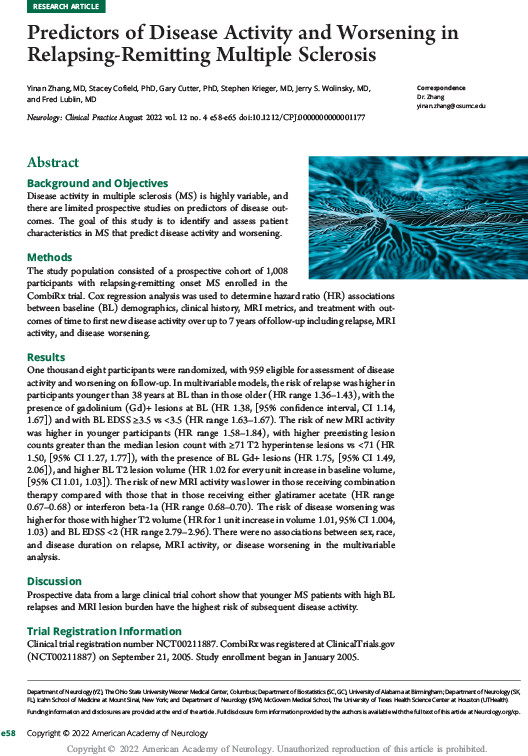Predictors of Disease Activity and Worsening in Relapsing-Remitting Multiple Sclerosis
Aug 23
Abstract
Background and Objectives Disease activity in multiple sclerosis (MS) is highly variable, and there are limited prospective studies on predictors of disease outcomes. The goal of this study is to identify and assess patient characteristics in MS that predict disease activity and worsening.
Methods The study population consisted of a prospective cohort of 1,008 participants with relapsing-remitting onset MS enrolled in the CombiRx trial. Cox regression analysis was used to determine hazard ratio (HR) associations between baseline (BL) demographics, clinical history, MRI metrics, and treatment with outcomes of time to first new disease activity over up to 7 years of follow-up including relapse, MRI activity, and disease worsening.
Results One thousand eight participants were randomized, with 959 eligible for assessment of disease activity and worsening on follow-up. In multivariable models, the risk of relapse was higher in participants younger than 38 years at BL than in those older (HR range 1.36–1.43), with the presence of gadolinium (Gd)+ lesions at BL (HR 1.38, [95% confidence interval, CI 1.14, 1.67]) and with BL EDSS ≥3.5 vs <3.5 (HR range 1.63–1.67). The risk of new MRI activity was higher in younger participants (HR range 1.58–1.84), with higher preexisting lesion counts greater than the median lesion count with ≥71 T2 hyperintense lesions vs <71 (HR 1.50, [95% CI 1.27, 1.77]), with the presence of BL Gd+ lesions (HR 1.75, [95% CI 1.49, 2.06]), and higher BL T2 lesion volume (HR 1.02 for every unit increase in baseline volume, [95% CI 1.01, 1.03]). The risk of new MRI activity was lower in those receiving combination therapy compared with those that in those receiving either glatiramer acetate (HR range 0.67–0.68) or interferon beta-1a (HR range 0.68–0.70). The risk of disease worsening was higher for those with higher T2 volume (HR for 1 unit increase in volume 1.01, 95% CI 1.004, 1.03) and BL EDSS <2 (HR range 2.79–2.96). There were no associations between sex, race, and disease duration on relapse, MRI activity, or disease worsening in the multivariable analysis.
Discussion Prospective data from a large clinical trial cohort show that younger MS patients with high BL relapses and MRI lesion burden have the highest risk of subsequent disease activity.
Trial Registration Information Clinical trial registration number NCT00211887. CombiRx was registered at ClinicalTrials.gov (NCT00211887) on September 21, 2005. Study enrollment began in January 2005.

